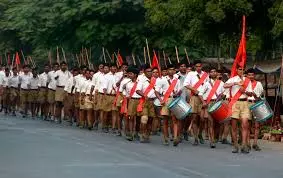AA Edit | Keep babus out of RSS

The Union government’s decision to lift the ban on government servants from attending the activities of the Rashtriya Swayamsewak Sangh (RSS), the ideological mentor of the ruling Bharatiya Janata Party (BJP), reflects the desperation of the Narendra Modi government to propitiate the driving force of the Hindutva movement for its survival. It is perhaps an announcement which makes an open secret one no more but the government has not yet given a credible explanation for a step which even Atal Behari Vajpayee, an RSS member himself, did not deem fit to take as Prime Minister.
The RSS would claim that it is a cultural organisation and its volunteers are into nation-building. It’s true that they appear at spots that have witnessed natural disasters or major accidents; its many offshoots are working among the tribal people and in rural areas. But those who have complained about the exclusivist agenda of this “volunteer force” have always viewed it with fear and trepidation.
The fact that the RSS was banned in Independent India in the aftermath of the assassination of Mahatma Gandhi at the instance of Sardar Vallabhai Patel, then deputy prime minister and home minister. The iron man of India took the decision “to root out the forces of hate and violence that are at work in our country to imperil the freedom of the nation and darken her fair name”. It was banned in 1975 during Emergency and then in 1992 after the razing of Babri Masjid, which the Supreme Court called “an egregious criminal act”. The ban on government servants from participating in RSS activities was first imposed in 1966 after a violent march of sadhus on the capital by sadhus demanding a ban on cow slaughter.
The RSS idea of Hindutva and its push for "one nation one culture" are at variance with the syncretic culture of India. Public servants openly endorsing the first cannot strengthen the second, and hence are unacceptable.
Next Story
